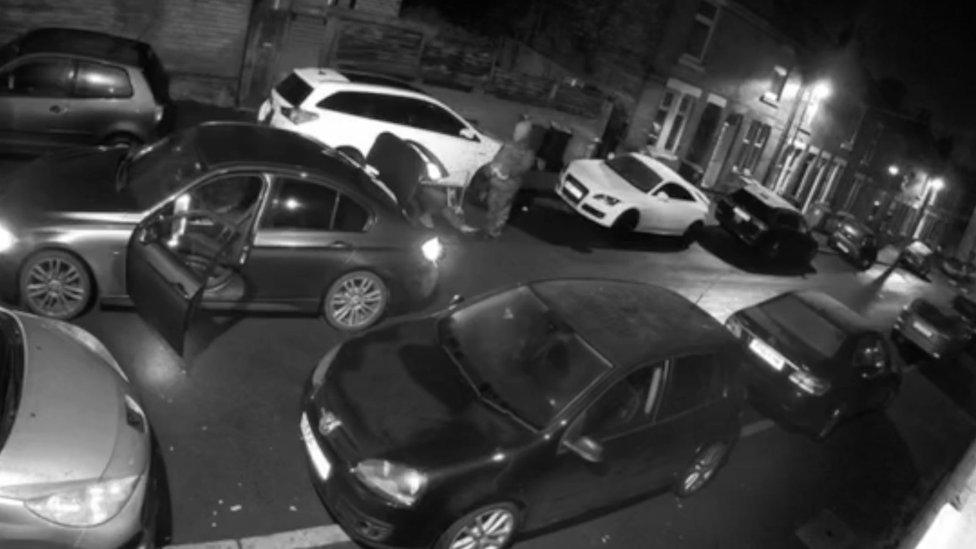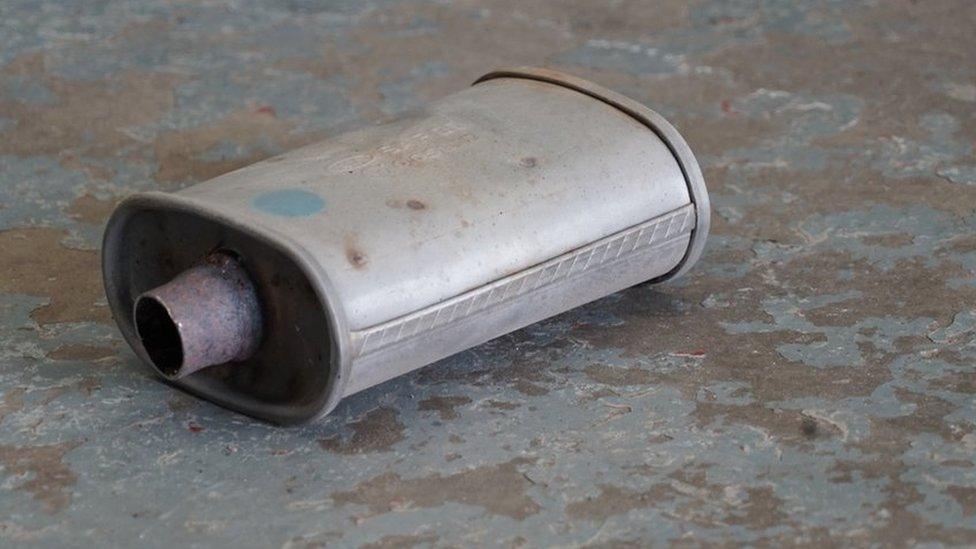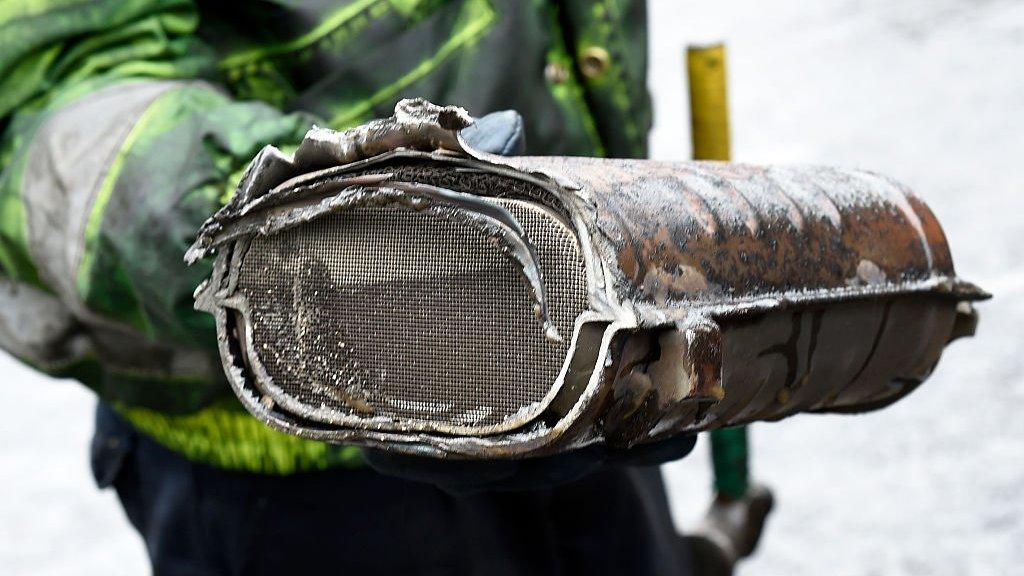Catalytic converter thefts in England and Wales rise sixfold
- Published

Thieves target a parked car in Nottingham
Thefts of catalytic converters from cars in England and Wales rose sixfold in 2019.
Last year, there were almost 13,000 recorded thefts of the devices, with Londoners particularly badly hit.
In 2018, there were just over 2,000 thefts.
Assistant Chief Constable Jenny Sims, car crime lead for the National Police Chiefs' Council, said police were committed to tackling the thefts and the organised gangs behind them.
"Police forces across the country are involved in planning and undertaking intelligence-led operations, at both the regional and national level, to stop converters from being stolen, as we recognise the devastating impact these crimes can have upon the lives of victims," she said.
The figures were released to 5 Live Investigations by police forces in England and Wales. Police Scotland and PSNI were unable to provide the relevant data.

Some catalytic converters contain three precious metals
Hospital staff targeted
While offences tailed off at the start of lockdown, anecdotal evidence suggests they are on the rise again - with a recent spate of thefts from hospital car parks targeting NHS staff.
The reason for the thieves' interest in catalytic converters - known as cats - is not difficult to understand.
There is a legitimate market for second-hand catalytic converters, which turn the noxious gases in a car's exhaust system into less harmful substances.
But the thieves want them for the scrap value of the three precious metals found inside.
Allow X content?
This article contains content provided by X. We ask for your permission before anything is loaded, as they may be using cookies and other technologies. You may want to read X’s cookie policy, external and privacy policy, external before accepting. To view this content choose ‘accept and continue’.
Prices have rocketed for rhodium, platinum and palladium, with palladium selling more per gram than gold last year.
Tracy Howl, a photographer from south-east London, had her "cat" stolen at a retail park in broad daylight earlier this month.
"I'd parked in a very open car park, I was only in for an hour," she said. "Then I switched on my engine and the noise coming from the car was like a motorbike - I thought the engine had blown up.
"Then I spotted there had been a clean split through the exhaust and I knew right away - it dawned on me - I'd been done."

Tracy Howl has been left with a repair bill of hundreds of pounds
As in most "cat" thefts, Tracy's car was simply jacked up and a power tool used to saw the box that contains the "cat" from the exhaust pipe under her car.
The damage almost left Tracy's car a write-off. She now faces a repair bill running into hundreds of pounds.
"Something is not being done if they have free rein like this. What can change to stop them being sold on?" she said.
Senior figures in the scrap industry believe the stolen "cats" are being passed from unlicensed scrap collectors to some unscrupulous licensed companies, from where the precious metals become untraceable.
What needs to change, they say, is the enforcement of a law which was passed in 2013 as a response to the copper thefts which were blighting the rail and power networks.
An easy market
The Scrap Metal Dealers Act was supposed to deprive metal thieves of an easy market by banning cash sales and insisting on much better identity checks on sellers.
Councils were empowered to do inspections of licensed dealers and to close down the unlicensed operators.
But 5 Live Investigations has discovered this isn't happening.
In October 2018, 243 English licensing councils were asked how many licensed scrap dealers on their books had been visited to ensure the new rules were being followed. The figures revealed only a fraction had been inspected and even fewer dealers - licensed and unlicensed - had been closed down.
5 Live Investigations asked the same councils the same questions in February this year and found little improvement.
Almost 120 councils had not visited any scrap dealers in the previous 28 months and many of the others had only inspected once or twice.
A small number of councils, however, had inspected and had taken action against the rogue dealers, often in joint operations with the police.
Part of the problem is that thousands of scrap dealers simply chose to drop out of the licensing scheme when the Scrap Metal Dealers Act came into force.
Many of those, says the industry, are now those dealers that advertise on the internet and buy catalytic converters with no questions asked.

Councils have limited powers
Nesil Caliskan, of the Local Government Association, said the Scrap Metal Dealers Act had contributed to a drop in metal thefts, but said they were on the increase again in part because of rising metal prices.
"Councils are targeting their limited resources as efficiently as possible and can take enforcement action where issues are identified," she said.
"Councils have limited powers to tackle unlicensed operators and the LGA has called on government to introduce greater enforcement powers to help local authorities tackle rogue operators."
The Home Office said the act was still a powerful tool for the police and local authorities, but said it would continue to work with the police and industry to see what more can be done to stop the thefts.
Nottinghamshire Police say drivers can do some things to protect their cars:
•If you can, park your vehicle in a locked garage when it is unattended.
•If that is not possible, park your vehicle in a busy, well-lit area as close to your property as possible.
•Consider installing a Thatcham-approved alarm to your vehicle. Ones that activate if your vehicle is lifted or tilted are particularly effective.
•Use a catalytic converter protection device or marking system.
- Published16 February 2019
